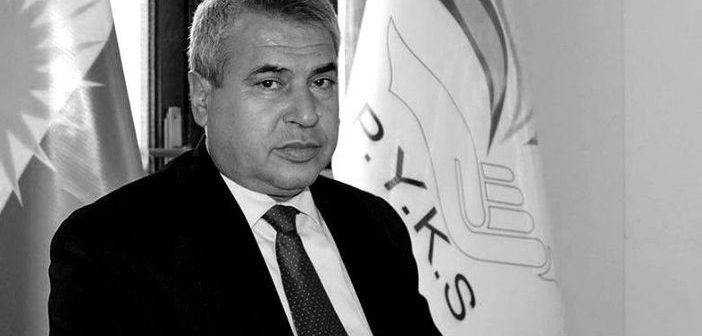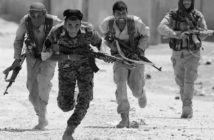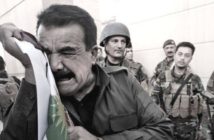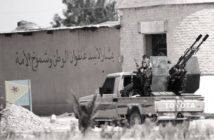Rarely taken into account in the analyses made about the future of the Syrian Kurdistan (Rojava), an opposition exists to the dominant Kurdish current represented by the PYD-YPG (Syrian political and arm of the PKK).
The Maghreb and Orient Courier met Ibrahim Biro in an hotel in Erbil.
He is the head of the Kurdish National Council in Syria (KNCS), exiled in the Iraqi Kurdistan.
The liberal philosophy of the KNCS breaks with the Marxist lines of the PKK, as does the proposal of Ibrahim Biro for a reconciliation and pragmatic attitude towards Turkey.
Ibrahim Biro does not hold back his words about the intentions of the fighters of the YPG, of whom the West has made heroes opposing the Islamic State.
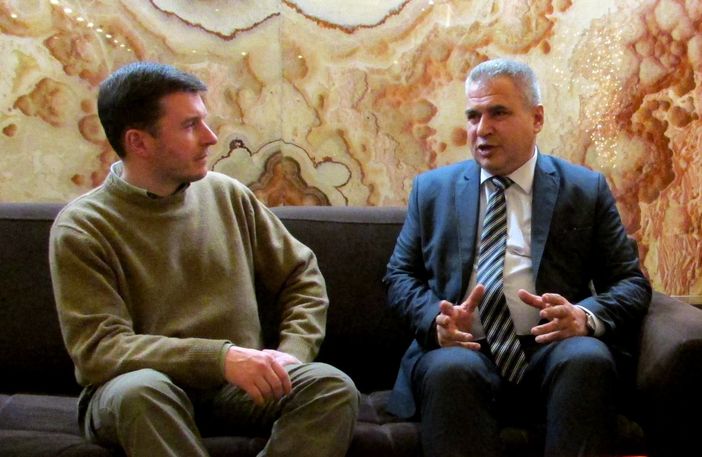 Pierre Piccinin da Prata (MOC) – What exactly is the Syrian National Council?
Pierre Piccinin da Prata (MOC) – What exactly is the Syrian National Council?
Ibrahim Biro – So… The Kurdish Council oversees 13 Kurdish political parties. It also has a number of female members, women. And also many social figures: people who are well-known in Syrian Kurdistan. It was established in November 2011, after the Syrian revolution started. The members, the parties, the organisations, in the Syrian Council have for many decades exercised political activities against Bashar al-Assad’s regime. For decades! And civil activities as well. As you know the Syrian regime oppresses the Kurdish people in Syria. And even before the Syrian revolution, one of the activities we had was a civil movement and protests against the regime.
Dozens of our members in different parties were imprisoned by the regime. I’m one of those, I was also imprisoned by the regime. Once the Syrian revolution started, we as the Kurdish movement, the Kurdish political parties, thought it was in our interest to come together, under one umbrella.
PPdP – This umbrella is the Kurdish National Council?
Ibrahim Biro – The Kurdish National Council in Syria. This is the title. In Kurdish it is “ENKS”. Similar to all the other groups in Syria, we were divided. One part of us joined and took sides with the regime, and the other half went into the opposition.
PPdP – Which part joined the regime?
Ibrahim Biro – The PYD. The PYD itself created other organisations. To give an example: they created a council called the “People’s Council in Rojava”. Then they changed their name to “Democratic Civil Movement”. The PYD is the political face of the YPG and closely linked to the PKK…
I should have explained this in the beginning: one of our colleagues, Abdel Hakim Bashar is a member of the leadership in the Kurdish National Council, and he is the deputy to the official Syrian opposition. So, we are officially part of the Syrian opposition to Bashar al-Assad.
Of course, he is also a member of the High Negotiations Committee. Every time Bashar al-Assad speaks to the opposition, the opposition is represented by a number of individuals. Our colleague is a member of that negotiation committee.
There were three rounds of Geneva talks. The first one was neither attended by the opposition, nor by Bashar. At the second round, the opposition did attend, and he was a member of the negotiation committee. Between the opposition and the regime.
PPdP – Who is Abdel Hakim, the representative of the Kurdish National Council? Is he in Damascus?
Ibrahim Biro – The High Negotiation Committee is in Riyadh, but he is based in Erbil. He is not in Erbil today. The Syrian opposition’s official headquarter is based in Istanbul.
By the way, I’m from Qamishli, from Syrian Kurdistan. Four months ago, I tried to go back, but PYD arrested me and kicked me out.
PPdP – At the beginning the Kurdish National Council was 13 parties, right?
Ibrahim Biro – Yes, they were…
PPdP – But now a lot of them have left to join the PYD to support YPG, isn’t it?
Ibrahim Biro – You’re right. But the parties were divided. Some individuals decided to stay with us, some have joined the PYD.
To give an example: One of our party’s secretaries left and joined the PYD. The leadership and the members… The party is broken! But, no party has entirely left the Kurdish Council.
PPdP – All the parties in the Kurdish National Council refuse to support the YPG?
Ibrahim Biro – There is no doubt! We have big differences between us.
PPdP – All refuse to support the YPG… There is no discussion?
Ibrahim Biro – There were three agreements that we had with PYD, under the auspices of Massoud Barzani, the president of the Kurdish Regional Government in Iraq. The latest one was in Dohuk. They called it the “Dohuk agreement”, signed in 2014. But PYD couldn’t implement the agreement because of two reasons.
The first reason is that the PYD is clearly part of PKK. PYD, as part of the PKK movement and its organisation, its ideology, is part of the Stalin kind of movement. It’s because of this that they cannot work in partnership with anyone else.
The second thing is the PYD agreement with the regime… Their objective, or their plan, is to look at Syria as a whole.
PPdP – Is it an agreement between the PYD and the regime?
Ibrahim Biro – Just after the Syrian revolution started, the regime asked us and the PYD to join the regime, to take their side, until Syria reaches a stage where some stability is restored.
PPdP – In the city of Hasaka, there was however a fight between the YPG and the Syrian army not a long time ago.
Ibrahim Biro – After five years of war, the PYD-YPG didn’t fire a single shot on any regime forces in any of the areas. The regime handed over the control of the area to the PYD. The interest was the oil exports along with wheat and cotton. It is a very rich area. There are still documents that show that these commodities are being handed over to the regime.
To go back to the fight that you’re talking about in Hasaka and Qamishli a while ago. Whilst the clashes were undergoing, and since then, to this very day, the PYD and the regime work together in a number of areas in Qamishli.
There is an area under the control of the regime forces. The agreement was that it will stay in control of the regime. The PYD crossed into that area which is predominately Arab. The regime wanted to show the local Arabs that they will defend its interest, and attacked the YPG to prevent them from coming into that area.
The regime is very smart. It’s been doing this, it’s been playing forces against each-other. It has 30 years of experience in Lebanon. It takes different groups and turns them against each-other to secure its own interest.
PPdP – To be clear, do you want the independence for Rojava?
Ibrahim Biro – We’re not asking for independence, we’re part of the Syrian opposition. We have a document that outlines what the future of Syria should look like. In this document, with the Syrian opposition, it states that the future of Syria should be a federal Syria, and we want a federal region, just like the Iraqi Kurdistan, in Rojava.
PPdP – When I met the Prime Minister of Rojava, about one year ago, he told me exactly the same. He said that they don’t have good relations with Damascus, but they have some relations, because they don’t want to break the negotiations, to obtain federalism. He told me that if they would break the relationship, the regime would cut the salary for civil workers, hospitals and so on… They’re still in Syria, he said.
Ibrahim Biro – A while ago, we had a common goal. That was a federal region for the Kurdish people in Rojava.
However, this has changed. The regime demanded that the PYD insists on a federal region of northern Syria. This federal region is a much bigger area than the Kurdish area and it’s designed to house not just a Kurdish federal region, but it’s to be a northern federal region that covers Kurdish and other areas. So, this isn’t a Kurdish project, this is just a federal northern region in Syria.
Some weeks ago, there was a conference by PYD officials in Rojava, announcing the northern federal region of Syria.
PPdP – In the way wanted by Damascus?
Ibrahim Biro – Yes, in the way wanted by Damascus. At the end of the conference PYD issued a statement. If this had been the regime holding this conference, they would have probably given something better than what the PYD gave. Because if you read the text of what the congress announced at the end, there is not a single world about Kurdish interest and the Kurdish people in northern Syria.
The PYD believes in an ideology called the “People’s Democracy” or the “Nation’s Democracy”. It is socialism, and underpinned by the PYD saying “we’re part of these countries”. There is nothing about its own Kurdish national goals. We have told them that if you’re against Kurdish national goals, why don’t you say anything about the other countries? The Turkish state, the Persian state, the Arab state? Why don’t you say anything about those? Why do you only stand against Kurdish national goals?
PPdP – You feel more nationalist than the YPG?
Ibrahim Biro – I have no doubt. If it wasn’t for our national interest, we could fight for Bashar al-Assad any day.
PPdP – The big difference is ideology. The PYD-YPG is more socialist, you are more liberal. They are more internationalist, you’re more focused on Kurdish interest.
Ibrahim Biro – There is no doubt that our ideology is very different to theirs. Our ideology isn’t Stalinist, it’s not leftist, it’s not communist. They can have their own ideology; it can be leftist, communist, whatever… But as long as they also look at Kurdish national goals, Kurdish interest, then it doesn’t matter if we have different creeds.
PPdP – To go back, to my other question. How many supporters does the PYD and KNC have? It’s just a feeling, but when I spend time in Rojava, I feel that the people are really supporting the YPG. Is it true that the majority supports the YPG there or was it just a feeling? I was in Derik, Qamishli, Hasaka…
Ibrahim Biro – Of course, we disagree with that. YPG has used arms and weapons to enforce itself in Rojava. They have oppressed the Kurdish people.
They’ve made many Kurds refugees. They push us away, threatening a Kurdish civil war. It’s important to realize that the PYD knows that there are thousands of Peshmerga fighters from Syria, from Rojava, in Erbil today, and they’re denying them the right to go back home.
The PYD has signed deals with the regime. It has signed deals with other units that it has created. For example, the Syrian Democratic Forces (SDF), the Arab movement, all of these small groups… PYD can sign deals with these units. It can create these kinds of units. It has signed deals with militias created by the regime in Kurdish cities, like in Hasaka. But it cannot sign one deal with Kurdish fighters affiliated to the Kurdish National Council. YPG signs all the deals they want except with Kurds!
They’ve exiled many of our people. If there’s an open election in Rojava, I believe, most would vote for us, not for the PYD.
First of all, the economy is very bad in Rojava. Some people are forced to do anything they can for their own survival. I believe that if any day the Peshmerga of Syrian Kurdistan cross the border with the Kurdish flag, many people, including the ones with PYD, will defect and join us. Because of the PYD’s policies against other Kurdish parties, and because of them exiling Kurdish members of other parties, because of them burning offices of other parties, because of their conscription policy, people are afraid to say anything.
PPdP – I noticed a difference between the Peshmerga in Iraqi Kurdistan affiliated to your movement, and the Kurdish fighters affiliated to YPG forces in Syria. Here, in Iraqi Kurdistan, Peshmerga are a bit older. Here, the young people don’t join the Peshmerga. Is it because of a difference in conscription policy?
Ibrahim Biro – Just to be clear. When we talk about Peshmerga, we’re not talking about our Peshmerga in Iraqi Kurdistan. There is a unit for the Kurdish National Council, a military wing, also called the Peshmerga of Rojava. The Peshmerga of Syrian Kurdistan. There are 3,500 of Kurdish Syrians from Hasaka, Qamishli, Afrin, Kobane… They are in Iraqi Kurdistan, in Erbil, in the front lines in Mosul, at the Mosul dam, in Sinjar, on the border with Rojava!
PYD is preventing Syrian Kurds, fighters from Kurdish cities in Syria to go back home! So, when I say Peshmerga of Rojava, I’m not talking about the ones you see in Iraqi Kurdistan, the Kurdish from Iraq. I’m talking about my Kurdish people who are part of the Kurdish National Council, who are based in Iraqi Kurdistan, because the PYD is not allowing them to go back home. I said earlier, that the YPG can sign deals with the Syrian regime, with Arabs, with local forces, then why can’t it sign one deal with its own Kurdish forces who are in Iraq?
PPdP – About the conscription…
Ibrahim Biro – If you look to our Peshmerga, they are also very young. We don’t have conscription. We don’t force people to join.
Most of the YPG soldiers are very young, and they look beautiful because of conscription, mandatory military service. If you ask me, I can give you names of our students affiliated to our parties, in universities, who have been taken out, and forced to fight for YPG. Every of our Rojava Peshmerga is a volunteer. Every single one of them.
The waiter… I spoke with him when he came here… He is one example. He is from Derik in Syrian Kurdistan and he left four years ago. I asked him: “Why did you leave?” He said: “Why did everybody leave? Because of conscription”. He was in university. There are thousands of people who are forced to leave because of conscription. There are two choices for our students. Either they go to conscription, so they join the YPG, or they come here and work. This is the option they have.
PPdP – You know, in Europe, today conscription is a little bit different from ten years ago. It changed because we have professional armies. But ten years ago, conscription was an obligation. If the country is under attack, you need the forces of the society and people.
Ibrahim Biro – We will never accept this argument, because there are thousands of volunteers already in the fight in Syrian Kurdistan. This is inexcusable. To take a student out of university and say that you have to be conscripted.
Maybe you can say that in other European countries conscription was a reality. The difference between European countries and the PYD is that the PYD haven’t come to power through elections or something that they would’ve come to power with in European countries. In Rojava, it’s a de-facto control of PYD. PYD just controls the battle space. So they force this on the locals.
PPdP – Do you mean that the main matter between your group and the YPG is clearly ideological, isn’t it?
Ibrahim Biro – Of course. As I said, PYD and YPG are the same Stalinist movement.
PPdP – Would you say that the YPG and PKK are totalitarian systems?
Ibrahim Biro – When I say the PKK, I mean that it’s the overall branch and the PYD is just a small branch of it. So, there is no distinction. And yes, of course it is totalitarian. Of course, there are big and strong ideological differences between us and them.
PPdP – Politically, are you more liberal? What’s your connection with PUK, the Iraqi Kurdish party supporting PKK?
Ibrahim Biro –Yes of course, we’re more liberal. We are democrats.
We have a relation with every Kurdish party. We have good relations with all the parties. Recently, we met with Kurdish political parties in Iraq, Iran and Turkey. Everybody was ready to receive us, and we met them to explain the plight of our people in Syrian Kurdistan and about what PYD is doing to the other parties. Of all the parties we met, only the Goran movement and PUK were not ready to listen to us. They didn’t receive our colleagues. I even contacted a member of the PUK’s political bureau, just to explain to him why we would want to see them.
They did not reply.

